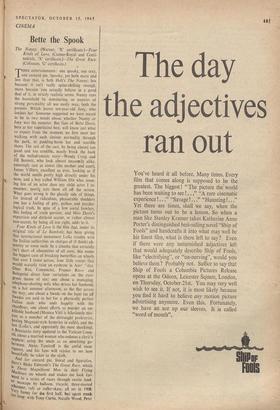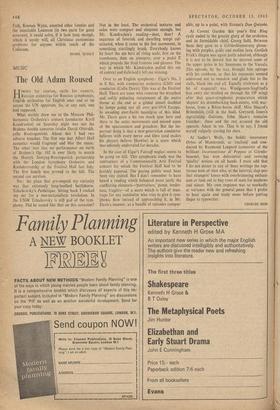CINEMA
Bette the Spook
The Nanny. (Warner, 'X' certificate.)—Four Kinds of Love. (Cameo-Royal and Conti- nentale, 'X' certificate.)—The Great Race. (Coliseum, `1.r certificate.) THREE entertainments: one spooky, one sexy, one custard pie. Spooky, yet both more and less than that, is Seth Holt's The Nanny; less because" it isn't really spine-chilling enough, more because you actually believe in a good deal of it, in strictly realistic terms. Nanny runs the household by dominating, as nannies of strong personality all too easily may, both the parents. Which leaves ten-year-old Joey, who loathes her. Someone suggested we were meant to be in two minds about whether Nanny or Joey was the monster. But fans of Bette Davis, here at her superlative best, will know just what to expect from the moment we first meet her walking with such sinister normality through the park, in pudding-basin hat and sensible shoes. The rest of the cast, by being almost too good and too credible, nearly break the back of the melodramatic story—Wendy Craig and Jill Bennett, who look almost uncankily alike, cunningly cast as sisters (the mother and aunt), James Villiers, excellent as ever, looking as if the world smells pretty high directly under his nose, and a boy called William Dix who, seem- ing less of an actor than any child actor I re- member, nearly acts them all off the screen. What goes wrong is the ghastly side of things, for instead of ridiculous, pleasurable shudders one has a feeling of pity, pathos and psycho- logical truth. In spite of a few social howlers, this feeling of 'truth persists; and Miss Davis's expatriate and déclassé accent, or rather almost non-accent, by being all too right, adds to it.
Four Kinds of Love is the film that, under its original title of Le Batnbole, has been giving that international 'monument Lollo trouble with the Italian authorities on cha'rges of (I think) ob- scenity or some such. In a cinema that certainly isn't short of obscenities of all sorts, this seems the biggest case of breaking butterflies on wheels that ever I came across, four little romps that Would scarcely raise an eyebrow in Aunt -dna. Dino Risi, Comencini, Franco Ross, and Bolognini direct four variations on the ever- green theme of sex; one about a managing, telephone-chatting wife who drives her husband, on a hot summer afternoon, to the flat across the way; one about a Swede on the hunt (as all Swedes are said to be) for a. physically perfect Italian male who ends happily with the chauffeur; one about efforts to murder an un- killable husband (Monica Vitti is hilariously mis- cast as a member of the distraught proletariat, having Magnani-style hysterics in cafés), and the last (Lollo's, and apparently the most shocking), a Boccaccio story updated to the Vatican Coun- cil, about a married woman who seduces a cleric's nephew,- using the uncle as an unwitting go- between. Akim Tamiroff is the awful mon- s-ignore, and his fans will rejoice to see how beautifully he takes to the cloth. And for custard pie, literal and figurative, there's Blake Edwards's The Great Race, which Is_ Those Magnificent Men in their Flying Machines on wheels and makes me look for- ward to a series of races through exotic land- Seascape by balloon, tricycle, three-masted uttotter, raft or roller-skate, all set in 1908: Vert' funny for the first half, but again much too long; with Tony Curtis, Natalie Wood, Peter Falk, Keenan Wynn, assorted other funnies and the inimitable Lemmon (in two parts for good measure), it could solve, if it lasts long enough, which it surely will, all Christmas pantomime problems for anyone within reach of the Coliseum.
ISABEL QUIGLY







































 Previous page
Previous page